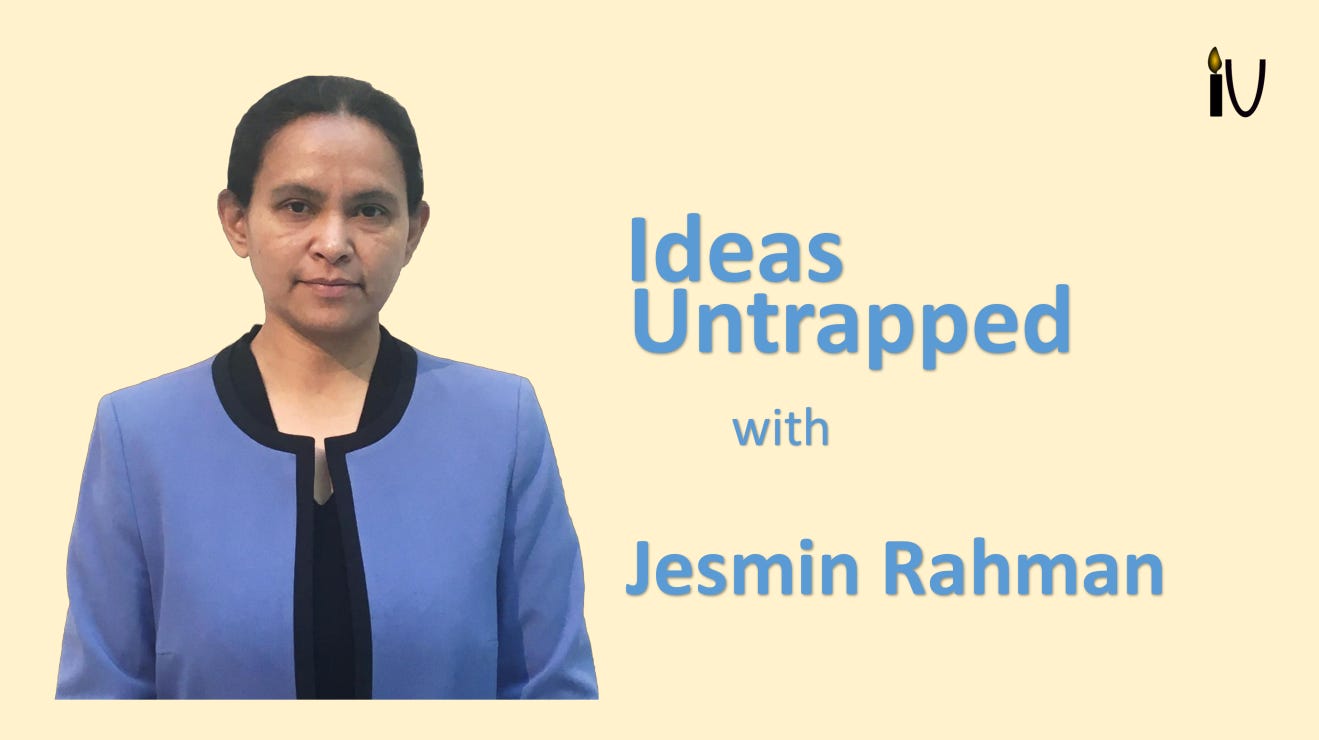
I had a quick chat with the IMF mission chief in Nigeria, Jesmin Rahman. I started by asking her whether Africa is facing another debt crisis. We ended the conversation with Jesmin outlining some reform measures that can put the continent on a long-term growth trajectory.
You can find us on all podcast platforms, some links to sources here. You can also find us on Spotify by simply searching for "Ideas Untrapped".
TRANSCRIPT
Tobi: Welcome to Ideas Untrapped and today I have with me, virtually, from Washington DC, Dr Jesmin Rahman who is the IMF Mission Chief for Nigeria. Welcome, Jesmin.
Jesmin: Thank you. Thank you for having me, it's a pleasure.
Tobi: Where to start would be that is Africa facing another debt crisis especially in the light of Covid19?
Average debt to GDP ratio in sub-Saharan Africa has increased by ten percentage points in the last decade, while average revenue to GDP ratio largely remain unchanged - JR
Jesmin: That's a very topical issue. Africa's debt gained global attention even before the Covid19 crisis. The debt level has been on the rise for quite some time and this is particularly true for low-income countries in sub-Saharan Africa. More than half of these countries were assessed to have been in or at risk of death distress in 2019. But even [for] those countries who were not facing [the] risk of debt distress there were two important vulnerabilities: the first is composition of debt - a growing share of debt has been to external commercial creditors, for example, this year more than half of sub-Saharan Africa's debt service payments are going to be made to these creditors whose terms are not as favourable as they are, let's say, for international financial institutions like the World Bank or the IMF. And the second vulnerability comes from [a] reduced capacity to repay debt. Average debt to GDP ratio in sub-Saharan Africa has increased by ten percentage points in the last decade, while average revenue to GDP ratio largely remain unchanged.
So, in other words, debt servicing capacity has fallen behind debt. So they were already vulnerabilities before the crisis on the debt front. What has happened since Covid19? The pandemic's impact on fiscal balance has been particularly devastating for commodity exporters, but really nobody has been spared. In the IMF's latest economic projections that we have just released, we are expecting real activity in sub-Saharan Africa to contract by more than 3 percent this year. Compare that to an average growth of 3 percent in [the] last two years. So we're expecting a sharp contraction in output, and, as you know, output contraction means lower fiscal revenues which together with higher spending needs to support life and livelihoods will raise deficits and debt across the continent. We are projecting average fiscal deficit in sub-Saharan Africa to nearly double this year compared to last year. Average debt level is also projected to rise significantly reaching above 60 percent of GDP.
Now, this is considerably lower than the levels that were reached in the 1990s, but there is a wide divergence across countries. Some countries are reaching very high debt levels. So bottom line, without a question, as a result of this pandemic, we are likely to see the number of low-income countries in Africa facing debt distress increase.
Raising revenues is Nigeria's largest fiscal challenge, I would say - JR
Tobi: You talked about divergences within the continent itself, so let's zero in on Nigeria here a bit which I'm sure most of our audiences are interested in. How large are the fiscal challenges that Nigeria faces? I know there have been some worries in some circles that the current path is not a sustainable one.
Jesmin: So [indistinct words] is one of those countries where debt level per se is not considerably high but debt-servicing capacity faces a precarious situation due to very low fiscal revenues. So let's look at debt first - overall public debt stock is estimated at 29 percent of GDP. This includes not just general government debt, but also all known potential government liabilities (in the IMF we like to be comprehensive). Now at this level, public debt is roughly half of the average in sub-Saharan Africa, it is also lower than various thresholds typically considered safe in analytical literature. As you know, there is no magic, one safe threshold that can work for all the countries. It depends on a country's growth performance, strength of policy and institutions, and risk perception, among other things... and we have looked at Nigeria's debt level from all of these angles and public debt appears sustainable. So that's on debt. But when we look at debt-servicing capacity, that is where you get out of the comfort zone - interest rates take up a large share of revenues. So for example, this year, all of [the] federal government's revenues are expected to be spent on interest payments. The problem is not exorbitant interest costs, the problem is low revenues. Adding debt without raising revenues only increases vulnerabilities. Raising revenues is Nigeria's largest fiscal challenge, I would say. Total revenues that include oil and non-oil was at 8 percent of GDP last year. Now, this is among the lowest in the world. To give you some perspectives, the average for sub-Saharan Africa is twice as high, the average for oil exporters is five times as high. Every government needs to collect a minimum level of revenues to deliver basic services and provide an enabling role for the public sector. We did some cross-country studies in IMF and based on that the IMF estimates that this minimum threshold is at 12 percent of GDP, now Nigeria's collection is much less than that. So this is a challenge that Nigeria must overcome if it is to put its fiscal house on a strong footing and provide the kind of service its citizens need. What is needed to be done? There is no easy fix. This is going to require a lot of technical and policy efforts in the areas of tax administration and tax policy, but above all, [a] very strong political will.
Take for example the CIT (Corporate Income Tax), Nigeria has a rather high rate at 30 percent but collection efficiency is very low because of widespread use of tax holidays and exemptions which are kind of sub-optimal compensation for a very difficult business environment. So raising revenues does not necessarily mean raising rates - JR
Tobi: Let's stay on this revenue issue because the usual discuss and I'd say, sometimes, response in policy circle is to conclude, as you've laid out this problem, that the government needs to collect more revenue and that means more taxes. But like you also said, the economy is shrinking. So isn't that a double whammy of some sorts, can you really raise revenue from a shrinking economy? Shouldn't growth policies be the priorities and then a growing economy means the government can then strategize ways to collect more from sectors that are growing?
Jesmin: Yeah, so let me unpack that... what I mean by increasing revenues, that does not necessarily mean increasing tax rates. Take for example the CIT (Corporate Income Tax), Nigeria has a rather high rate at 30 percent but collection efficiency is very low because of widespread use of tax holidays and exemptions which are kind of sub-optimal compensation for a very difficult business environment. So raising revenues does not necessarily mean raising rates. It means collection efficiency and this is particularly true in the case of Nigeria - the active taxpayer share is very low across tax categories whether we're talking about VAT (Value Added Tax), CIT, [or] PIT (Personal Income Tax). So, indeed, the first order of business is to broaden the tax base by taking away some of these exemptions, improving the large taxpayer units, making sure that you have a taxpayer register which is up-to-date, properly segmenting the various taxpayers into small, medium, large taxpayers so you can properly target them, improve compliance...so these are really much more important than, let's say, increasing tax rate. On tax rate, for example, Nigeria has a very low VAT rate. It used to be 5 percent, was increased recently to seven and a half, and it's much lower than let's say ECOWAS countries which are your neighbours and comparable to Nigeria. But as I said, this is not the time to look at the rate increase. Indeed, the first order of business for Nigeria is to actually make sure to collect what is collectable while it increases efficiency.
But this crisis is very different. It is unique and massive in its scale. This is not your typical balance of payments crisis that a developing or emerging market country faces- JR
Tobi: Thanks for that clarification. Looking at the liquidity challenges that some countries have faced especially in the light of the crisis, emerging markets by some estimates have seen capital outflows of over 40 billion dollars. Some have argued, and I want to get your reaction to it, that the IMF has an important role as some of intermediator or lender-of-last-resort given that the access of countries to dollar swap market is not equal. So is that a role that the fund is really stepping up to at this moment?
Jesmin: You are absolutely right. Countries typically come to the IMF when they are facing challenging circumstances. For example, the government is not able to pay for vital public spending or there is not enough foreign exchange to pay for necessary inputs or service debt. But this crisis is very different. It is unique and massive in its scale. This is not your typical balance of payments crisis that a developing or emerging market country faces. We have a global pandemic which is wrecking a havoc on lives and economies across the world. Countries are being hit by not one, but in some cases three to four simultaneous shocks, right? You have a health crisis, you've got a commodity price shock, lack of access to the international financial market, and plunging external demand. So there is [a] super urgent need for financial assistance, and no wonder some 100 member countries have reached out to us for assistance.
So how is the IMF handling, sort of, this very unique crisis? Now fully understanding the nature and depth of the crisis, the fund has stepped up lending through its two emergency financing facilities. One of these facilities which is called the Rapid Credit Facility is fully dedicated to low-income countries. And loans from this facility have a zero interest rate and a grace period of five and a half years. What that means is that if you borrow from this window you don't have to pay anything for the next five and a half years, so it takes you through the whole crisis period. There is a second window which is called the Rapid Financing Instrument, that's for our general membership and it also carries a very low interest rate right now of one and a half percent. The IMF has also temporarily doubled access limits for these two facilities. So why these facilities and not through regular IMF loans? Well, these facilities allow the fund to provide emergency assistance without the need to have a full-fledge program in place. As you know this full-fledged IMF programs take time to negotiate, they have conditions and these take time to put in place.
Under the emergency facilities, money can be disbursed very quickly, to access member countries, [to] address their health and other vital fiscal needs. And we have so far disbursed some 10 billion US dollars to Africa, and this amount, to give you a perspective, is about 10 times our average in recent past. Typically we lend about a billion-dollar a year and this is 10 billion already and we're not done with the year. So that tells you the enormity of the crisis and also IMF's commensurate response. So we're still a lender-of-last-resort if you like. In this crisis, we have played that role as countries have come to us facing large financing needs and being shut out of market access. But in addition, if you like, the IMF has also played kind of a role of a first responder, in some cases, rushing to provide emergency aid to member countries.
In addition, the government has also committed to undertake a safeguards assessment of the Central Bank. Let me also mentioned that the Nigerian government has specified two very important policy tensions as part of the RFI request: first, to move towards exchange rate unification and greater flexibility; and second, to strengthen domestic revenue mobilization efforts once the crisis passes - JR
Tobi: Using the RFI, which I believe Nigeria has accessed (that's the Rapid Financing Instrument)... using that as a case study now, the general information made available is that this instrument comes with no conditionalities, but a standard practice with the fund [is] that there are accountability measures. Can you explain or lay it out for us some of the accountability measures that are required to access and implement this fund?
Jesmin: The two emergency financing facilities as their name suggests are intended to be rapid. So money is disbursed upfront upon approval of the request without our traditional ex-post conditionality. But as you mention, it is important to ensure that resources are not improperly diverted. At the time of urgent crisis like this one, where many countries are under lockdown or there is restricted mobility, one has to zero in on what is absolutely critical and implementable, right? And without unduly burdening the government. That's what we're trying to do. So let's look at Nigeria's RFI, the government approached us for emergency assistance being hit by the twin shocks - covid-19 pandemic and a plunging oil price. The IMF board approved assistance of 3.4 billion dollars which is equivalent to 100 percent of Nigeria's quota under the RFI on April 28th, and the assistance is meant to help Nigerian government provide critical support to the healthcare sector, help shield jobs and also limit the decline in the national reserves. So even though there are no conditionalities, there are important policy commitments made to safeguard the use of resources.
Let me give you the examples: the government has committed to create special budget lines to record all emergency response measures - these will be published on Nigeria's treasury online portal. They have also committed to undertake an independent audit of crisis mitigation spending and related procurement processes. Again, the procurement plans and notices for all emergency response activities including the names of awarded companies and beneficial owners are to be published. The idea behind all of this is to strengthen budgetary oversight of financial assistance through full transparency. In addition, the government has also committed to undertake a safeguards assessment of the Central Bank. Let me also mentioned that the Nigerian government has specified two very important policy tensions as part of the RFI request: first, to move towards exchange rate unification and greater flexibility; and second, to strengthen domestic revenue mobilization efforts once the crisis passes. You mentioned in the beginning, you know, [that] one has to carefully look at the revenue situation given the current economic crisis that we are in - so we urge the government to step up these efforts once the crisis passes. And both of these policies are very critical to ensuring macroeconomic stability.
Tobi: I guess an obvious question is... governments have committed to some of these policy measures in the past and either for political reasons or otherwise, they've reneged. Are there at enforcement measures for compliance?
Jesmin: We are very much engaged with the government in terms of policy dialogue, assisting them in any way through technical assistance, through analytical support, so we will remain engaged with the government in coming months to help them implement these measures. But as I mentioned these are not conditionality per se, so in that sense, it's not like a typical IMF program where you have a review and the team goes and checks implementation against a sort of benchmark.
I used to work in Europe and before that [in] Asia, when I compare Africa to, let's say, European growth model or Asian growth model, one thing that stands out is how low the contribution of export sector is to growth in Africa. You have more [some] successful cases but generally speaking, this is a lake that Africa hasn't relied on too much - JR
Tobi: On a final note and this is speculative a bit... What are the long-term growth reform measures that low-income countries can put in place to get out of repeated sovereign debt crisis? Because it's like an old story and where does it end? How does it end?
Jesmin: Yeah. You raise a very important issue, it feels like deja vu, right, every time we get into the debt crisis. A few things: we talked in the beginning of our discussion and the importance of revenue mobilization, I think that is absolutely critical. When you look at what happened to revenue to GDP ratio in let's say sub-Saharan Africa over the last decade or 15 years; as I mentioned, it hasn't moved much, and we try to find successful cases of sustained revenue mobilization period in sub-Saharan Africa. And when you look at this long period of time, let's say, since 2000, there are only a handful of these episodes (6 or so). So it's incredibly challenging. Not just the technicalities of it, [but] because it's such a slow-moving animal if you like... achievements come very slowly and political cycles are short, you really need someone to own the process and be the big push - the big political push behind it to bring in large gains. So first thing would be to put the revenue house on a secure footing, increase domestic revenues so that you don't have to go out and borrow as much, right? That's first. The second would be to improve the growth performance so to say. Not having growth too tied to commodity cycles, so economic diversification... I used to work in Europe and before that [in] Asia, when I compare Africa to, let's say, European growth model or Asian growth model, one thing that stands out is how low the contribution of export sector is to growth in Africa. You have more [some] successful cases but generally speaking, this is a lake that Africa hasn't relied on too much. But the same time Africa is a young continent, it has a lot of human resources but you need to build these resources up so that investment comes.

Weather investment comes from outside or whether domestic or regional or continental investors pick this human resources up and make good use of it, it doesn't matter. But you need some ground conditions to be in place. You need a business environment that people can count on, that investors can count on. You need regular trade facilitating infrastructure in place. So all of these what we call sort of structural reform (you know, good structural conditions, enabling conditions for businesses to take off), you need all of those reforms as well as good investment in human capital so [that] population is not a liability, [but] population becomes your resource and that's how growth will take off. And if you've got the domestic going revenue mobilization and you have your growth going, that is how the continent can take care of its debt problems in a lasting way.
Tobi: That's a very interesting answer and there's a lot to unpack in there. Thank you very much, Jesmin, it's been wonderful talking to you.
Jesmin: Thank you, it has been my pleasure.













IS THIS TIME DIFFERENT?